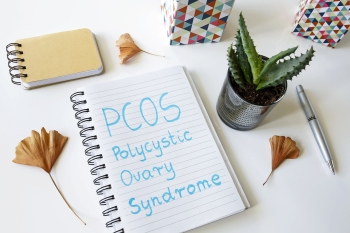
How Polycystic Ovary Syndrome Can Impact Your Mental Health
Polycystic ovary syndrome, or PCOS, is a chronic health condition characterized by hormonal imbalance in people with ovaries. It can also, but not always, include cysts on the ovaries, and often negatively impacts fertility. This condition affects approximately 1 in 10 people with ovaries of reproductive age. The symptoms of PCOS can have negative effects on mental health, including depression, anxiety, grief, and body image issues. Knowing the connection between PCOS and mental health issues and how to seek help for them can make living with this condition much more manageable from a mental health perspective.
What is PCOS?
PCOS can present differently from person to person. The hormone imbalance, in which higher levels of androgens are present, can lead to a host of symptoms, including:
- Irregular or absent menstrual cycles
- Irregular bleeding or spotting
- Weight gain
- Difficulty losing weight
- Insulin resistance
- Abdominal pain
- Hair loss from head
- Excess hair growth on face, neck, and body (also known as hirsutism)
- Mood swings
- Cystic acne
- Oily skin
- Skin tag growth
- Bloating
- Fertility issues
- Sleep issues
- Fatigue
PCOS is also linked with other health conditions, including diabetes, ovarian cancer, sleep apnea, fatty liver disease, and high blood pressure. Getting diagnosed with PCOS involves speaking to your doctor about your symptoms, getting blood tests, and potentially ultrasounds to check your uterus, cervix, ovaries, and fallopian tubes. In addition to these physical symptoms, there is also a connection between PCOS and mental health conditions.
PCOS and Mental Health
PCOS can affect your mental health for a number of reasons. First, many people experience difficulty receiving a PCOS diagnosis from a doctor, and for some it takes many years. Part of that difficulty stems from a common symptom of PCOS: weight gain. The unfortunate truth is that many doctors are not educated about the weight gain and subsequent insulin resistance and difficulty losing weight that are caused by PCOS, and will tell patients to simply “lose the weight” to get better without truly understanding how difficult that can be. (It is important to note that there is a lean-type PCOS that affects people who are “normal” weight according to doctors, though those cases seem to be the minority.) Feeling unheard by a doctor and left with unexplained unpleasant symptoms can lead to frustration, fear, depression, and anxiety. A therapist can help you with this by discussing how to advocate for yourself through assertive communication, resource gathering, and setting boundaries, and can also help you talk through your negative feelings around this issue.
Body image issues are also a common link between PCOS and mental health difficulties. Many symptoms of PCOS have an effect on one’s outer appearance, including weight gain, acne, hair loss from the head, hirsutism, skin tag growth, etc. There is also a societal stigma around being “overweight” that contributes to feeling negatively about a body that is not ideal according to mass media. Therapists help with body image issues by guiding you to challenge societal ideals and the negative messages you (and others) tell yourself about your body, finding things you love about what your body can do, and facilitating growth of self-confidence.
Often, PCOS leads to increased cortisol levels in the body. Cortisol is your body’s stress hormone, usually activated during those intense fight-or-flight moments. While it is good in those situations, too much cortisol can be associated with health conditions both mental and physical. Having an excess of cortisol makes your body think that you are constantly in danger, which leads to feelings of anxiety. Therapists are armed with all sorts of anxiety reduction techniques, including meditation, mindfulness, and other cognitive-behavioral strategies that help you feel more relaxed - which may actually help you lower your cortisol levels.
One significant effect of PCOS is that it can negatively impact fertility. Many people with PCOS find it difficult to conceive, and they are more likely to experience miscarriage than people without PCOS. This sort of loss can come with tremendous amounts of pain, anger, and grief. Therapists can help you through this grieving process by teaching you how to be gentle with and take care of yourself while remembering and honoring whom or whatever you have lost.
These are just a few of the connections between PCOS and mental health issues, but there may be many more; this condition is currently under-researched despite being quite common throughout the world. While there is no cure for PCOS, there are several options to treat symptoms, including medication, supplements, diet and lifestyle changes, hair removal, fertility treatments, and naturopathic strategies such as acupuncture and herbal medicine. You may want to speak with a trusted healthcare provider to discuss which treatments are right for you.
If you would like to talk with a therapist about the connection between your PCOS and mental health, contact the Center for Growth at https://www.thecenterforgrowth.com/contact.














